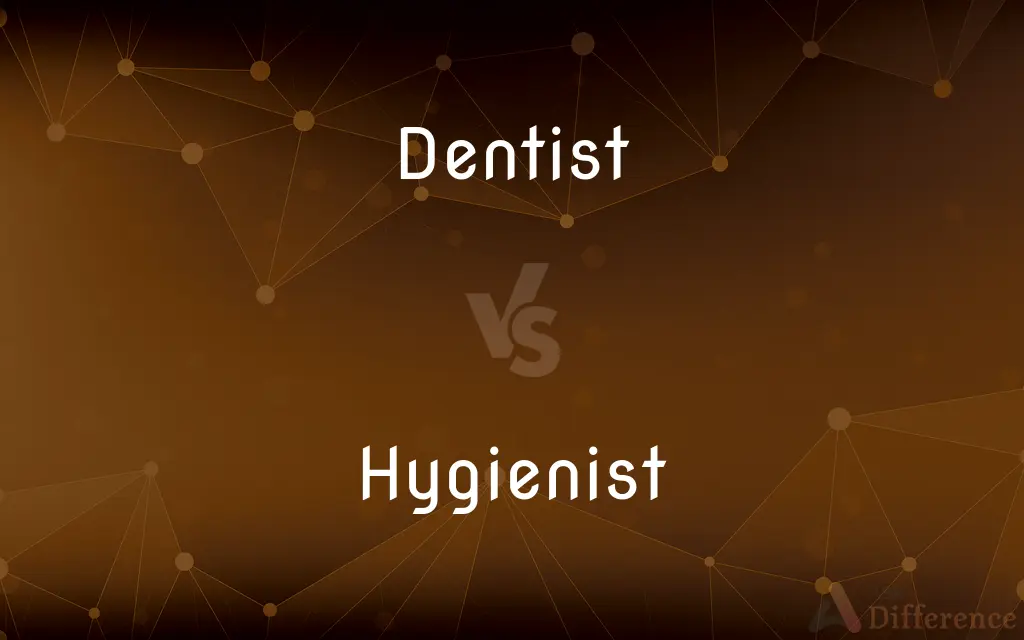Dentist vs. Hygienist — What's the Difference?
Edited by Tayyaba Rehman — By Maham Liaqat — Published on March 9, 2024
A dentist is a healthcare professional specializing in diagnosing and treating oral diseases, while a dental hygienist focuses on preventive oral care and hygiene.

Difference Between Dentist and Hygienist
Table of Contents
ADVERTISEMENT
Key Differences
Dentists are qualified to perform dental procedures, diagnose oral diseases, prescribe medications, and develop treatment plans for overall oral health care. Dental hygienists primarily focus on preventive oral health care, including teeth cleaning, educating patients on proper oral hygiene, and assisting dentists with certain tasks.
The training for dentists involves completing dental school, which includes both classroom education and clinical practice, leading to a Doctor of Dental Surgery (DDS) or Doctor of Dental Medicine (DMD) degree. Dental hygienists typically earn an associate's degree in dental hygiene, requiring less time in school compared to dentists.
Dentists can perform a wide range of dental procedures such as fillings, extractions, crowns, and root canals. They also oversee the work of dental hygienists and assistants. Dental hygienists perform teeth cleanings, apply sealants and fluorides, and take dental x-rays under the supervision of a dentist.
Dentists have a broader scope of practice that includes both diagnosing and treating oral health issues, while dental hygienists specialize in preventive care, working to keep patients' teeth and gums healthy and educating them on how to maintain oral health.
Dentists often run their own practices or work in higher-level positions within dental offices, requiring skills in management and patient care. Dental hygienists typically do not own practices but are crucial team members in dental offices, focusing on direct patient care.
ADVERTISEMENT
Comparison Chart
Role
Diagnoses and treats oral diseases, performs dental procedures
Focuses on preventive oral care, cleans teeth
Education
Doctor of Dental Surgery (DDS) or Doctor of Dental Medicine (DMD) degree
Associate's or bachelor's degree in dental hygiene
Procedures
Can perform surgeries, prescribe medications, and more
Limited to cleaning, sealants, fluoride treatments, and x-rays
Supervision
Oversees dental hygienists and assistants
Works under the supervision of a dentist
Focus
Overall oral health care, including treatment and diagnosis
Preventive care, patient education on oral hygiene
Compare with Definitions
Dentist
A medical professional specializing in oral health.
The dentist diagnosed the patient with a cavity and recommended a filling.
Hygienist
A healthcare professional focusing on preventive oral care.
The dental hygienist cleaned my teeth and removed plaque.
Dentist
May specialize in various areas of dentistry.
She visited a pediatric dentist for her child's dental care.
Hygienist
Performs teeth cleanings and applies preventive treatments.
During my visit, the hygienist applied fluoride to strengthen my teeth.
Dentist
Performs a wide range of dental procedures.
Our dentist performed a root canal to treat the infection.
Hygienist
Assists dentists during procedures.
The dental hygienist assisted the dentist during the filling procedure.
Dentist
Prescribes medications for dental issues.
The dentist prescribed antibiotics for the oral infection.
Hygienist
Educates patients on oral hygiene.
The hygienist taught me better brushing and flossing techniques.
Dentist
Develops comprehensive treatment plans.
The dentist outlined a treatment plan for the patient's gum disease.
Hygienist
Takes dental x-rays and assesses oral health.
The hygienist took x-rays to check for hidden tooth decay.
Dentist
A person who is trained and licensed to practice dentistry.
Hygienist
The science that deals with the promotion and preservation of health. Also called hygienics.
Dentist
A medical doctor who specializes in dentistry.
Hygienist
Conditions and practices that serve to promote or preserve health
Hygiene in the workplace.
Personal hygiene.
Dentist
One whose business it is to clean, extract, or repair natural teeth, and to make and insert artificial ones; a dental surgeon.
Hygienist
A person skilled in hygienics, but especially a dental assistant who cleans teeth etc
Dentist
A person qualified to practice dentistry
Hygienist
One versed in hygiene.
Common Curiosities
How long does it take to become a dental hygienist compared to a dentist?
Becoming a dental hygienist typically requires 2-4 years of education, while becoming a dentist requires at least 8 years, including undergraduate and dental school.
Can dentists perform surgery?
Yes, dentists can perform various types of oral surgeries.
Do both dentists and dental hygienists need to be licensed?
Yes, both professions require licensure to practice, which includes passing national and state exams.
Do dental hygienists work independently?
Dental hygienists work under the supervision of dentists and do not practice independently.
Are dental hygienists qualified to diagnose oral diseases?
No, diagnosing diseases is the responsibility of dentists, though hygienists can assist in identifying potential issues.
Is it more common to visit a dentist or a dental hygienist for routine oral care?
Routine care, such as cleanings, is typically performed by a dental hygienist, but a dentist will perform exams and any necessary treatments.
Can a dental hygienist fill cavities?
No, filling cavities is a procedure performed by dentists.
What's the difference in salary between a dentist and a dental hygienist?
Dentists generally earn a higher salary than dental hygienists due to their extensive training and broader scope of practice.
What type of preventive care do dental hygienists provide?
They provide teeth cleanings, apply sealants and fluoride, and educate patients on oral hygiene.
Can a dental hygienist become a dentist?
Yes, but they must complete dental school to obtain a DDS or DMD degree.
Can dentists write prescriptions?
Yes, dentists can prescribe medications related to dental care.
What additional roles can dentists have that hygienists cannot?
Dentists can own practices, perform complex procedures, and make final treatment decisions.
Do dental hygienists need to continue their education?
Yes, like dentists, they are required to complete continuing education to maintain their licensure and stay updated on the latest in dental care.
How important is the role of a dental hygienist in a dental office?
Very important, as they are key in preventive care and patient education, which are critical for maintaining oral health.
Can dental hygienists specialize in areas of dental care?
While their scope is more focused, hygienists can gain certifications in areas like pediatric care or public health to enhance their skills.
Share Your Discovery

Previous Comparison
Tapioca Pudding vs. Rice Pudding
Next Comparison
Obstacle vs. ImpedimentAuthor Spotlight
Written by
Maham LiaqatEdited by
Tayyaba RehmanTayyaba Rehman is a distinguished writer, currently serving as a primary contributor to askdifference.com. As a researcher in semantics and etymology, Tayyaba's passion for the complexity of languages and their distinctions has found a perfect home on the platform. Tayyaba delves into the intricacies of language, distinguishing between commonly confused words and phrases, thereby providing clarity for readers worldwide.














































